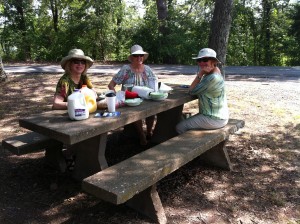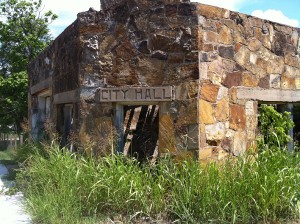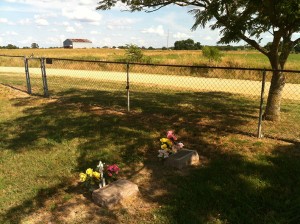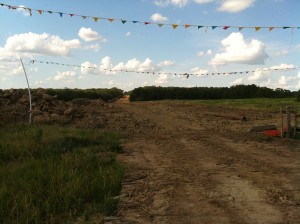The following guest post is Part I in a series written by Rachel Jackson, the Tour Leader for Global Exchange’s ‘Radical Oklahoma’ Reality Tour trip happening now.

Tour participants eat a healthy breakfast in the shade.
Radical Oklahoma – Red State Reality Tour

Lake Tenkiller, near Gore, OK.
On Sunday, after a quick round up in Tulsa of our tour guests and a mad supermarket dash for breakfast supplies, we headed to Lake Tenkiller State Park.
On the way we crossed the boundary between Muscogee Creek Country into Cherokee Country, where the lake is located. We arrived in time for dinner at Soda Steve’s, a local establishment that makes it own root beer and cream soda.
This morning on Day 2, we woke up in a leisurely fashion to sunrise over Lake Tenkiller and enjoyed a picnic breakfast at a table outside our cabin. We got on the road mid-morning and took the back roads scenic route across OK Highway 9 west toward Sasakwa.

This is the remains of the old city hall in Sasakwa City Hall. Perhaps some Green Corn rebels were detained here.
Our goal was to tour the countryside around the site of the Green Corn Rebellion. Our trip took us out of Cherokee territory, through Muscogee Creek Country, and into the Seminole Nation – three of the five tribes removed from the southeastern United States into Indian Territory during the 1830’s removal era. The federal government assigned these tribes (the first among many more) a new, and much smaller, land base that these nations still claim today.
The Green Corn Rebellion was an armed insurrection that occurred in early August 1917. Occurring in reaction to the World War I Conscription Act, its goal was to protest the draft of the poor to fight in “a rich man’s war.”

Lone Dove Cemetery, just north of Sasakwa – a supposed site of internment for several Green Corn Rebels.
The rebels involved were members and sympathizers with the Working Class Union, a loosely affiliated branch of the Industrial Workers of the World that organized African American, Native American, and white tenant farmers, sharecroppers, miners, and oil field workers who saw class concerns as a unifying force.
In the days prior to rebellion, the rebels committed numerous acts of sabotage such as dynamiting railroad trestles and cutting telegraph lines to halt the mechanisms of capitalism that were driving U.S. involvement in the war. Though the story is complicated, the plan was to continue such acts of sabotage all the way to Washington, D.C., meeting up with other rebels across the country along the way.
The rebels, however, never made it out of the area. They were stopped by posses made up of their neighbors and community members. Knowing they couldn’t shoot men they knew (they were prepared to shoot nameless National Guardsmen), the rebels laid down their arms and gave themselves up for arrest. According to historic records, all in all 458 men were arrested, many of whom went on to serve significant sentences. The key leaders of the WCU were sentenced to ten years in Leavenworth federal penitentiary.
While the Green Corn rebels were suppressed through accusations of disloyalty and syndicalism, so was the rebellion. That is, few Oklahomans know of it because official narratives of state history do not account for it. It’s hard not to wonder how Oklahoma might be different if this story were publicly acknowledged, or perhaps even heralded, as a collective expression of conscientious objection to unbridled greed and war.

The Keystone XL Pipeline construction path, crossing OK Highway 270, outside of Holdenville, OK.
What might a roadside historical marker say about these rebels, impoverished workers in the Oklahoma countryside, who emboldened each other to take a stand?
On the way back to Tenkiller, we took a slightly different route, and came across – quite by accident – the path being cut across Oklahoma for the Keystone XL Pipeline. Certainly the Green Corn Rebels should inspire us all to put a stop to that mess.
Rachel Jackson is a PhD Candidate and Dissertation Fellow at the University of Oklahoma in the Composition, Rhetoric, and Literacy Program, Department of English. She researches and theorizes the impact of suppressed local histories of resistance on Oklahoma’s current political identity.
 TAKE ACTION!
TAKE ACTION!
- Plan a trip of your own: Did you know that Global Exchange Reality Tours offers customized trips? Where do you want to explore next? Let Global Exchange help you travel consciously!
- Check out photos from the Radical Oklahoma Reality Tour on Facebook
- Remember to check back to our blog for Rachel’s next report back from the Oklahoma road!
